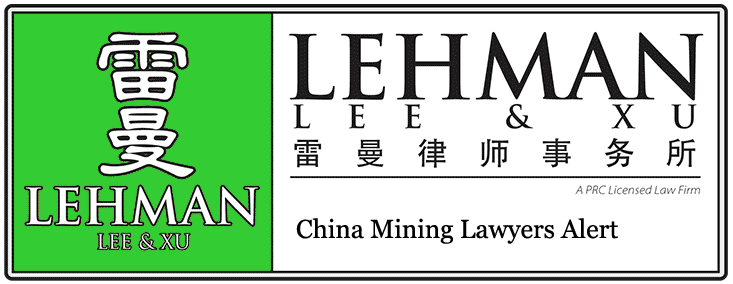
 |
|
LEHMAN, LEE & XU China Lawyers
|
|
China Mining Lawyers Alert
|
|
January 2014
|
The China Law News keeps you on top of business, economic and political events in the China. |
|
|
|
In the News |
Future Remains Unclear for U.S. Mining Executive Stuck in Mongolia |
Fifteen months after discovering he wasn’t allowed to leave Mongolia, U.S. mining executive Justin Kapla still doesn’t know when authorities will lift the travel ban imposed under a sweeping local law that underscores the risks of working in the landlocked nation’s fledgling mineral industry. Those barred from leaving Mongolia say about 20 foreign executives in the last two years may have been subject to similar bans under the 11-year-old law, which allows authorities to stop foreigners wanted for questioning in civil disputes, criminal probes or immigration cases from leaving the country. Facing a rise in public demands for a more equal share in the profits of mining wealth, Ulan Bator sought two years ago to set more stringent standards for foreign companies eager to develop its coal and metal mines. These new conditions called for closer state scrutiny of mining deals with foreign companies, especially state-owned ones. This brought attention to Mr. Kapla’s employer, Hong Kong- and Toronto-listed SouthGobi Resources Ltd., which was trying to close a deal with a Chinese state-run company. As it raised its barriers, Ulan Bator threatened to suspend SouthGobi’s mining licenses, which control some 800 million metric tons of Mongolian seams. These moves, along with changes to Mongolia’s mining laws, killed the $920 million Chinese bid to acquire 60% of SouthGobi Resources, according to SouthGobi’s former chief executive. Mr. Kapla, a 40-year-old Minneapolis, Minn. native, was then president of SouthGobi Sands LLC, a mining unit wholly owned by SouthGobi Resources. About a month after Aluminum Corp. of China’s bid sank, and as a state probe into SouthGobi’s finances deepened, Mr. Kapla and two colleagues found themselves barred from leaving Mongolia. Mr. Kapla said in an interview Monday that Mongolian authorities have not filed formal charges but have in private conversations accused him, SouthGobi Sands and former colleagues – Philippine nationals Cristobal David and Hilarion Cajucom Jr. – of laundering around six trillion tugrik ($3.7 billion), the local currency, and evading $105 million in taxes. Messrs. David and Cajucom, who are also unable to leave Mongolia, deny the allegations, as does Mr. Kapla. But state prosecutors privately told investigators, at least once in a document seen by Mr. Kapla, that the government doesn’t have enough evidence to make a case, he said. “There’s nowhere where you can see how they came up with these things,” Mr. Kapla said. Mongolia’s Ministry of Justice referred questions to the State General Prosecutor’s Office. Reached by phone, Ganzorig, the director of the prosecutors’ foreign relations division who like many Mongolians goes by one name, asked a reporter to call back later then didn’t respond to subsequent calls. The U.S. ambassador to Mongolia has raised Mr. Kapla’s detention with the country’s justice minister, according to an embassy email dated March and forwarded by Mr. Kapla. According to the email, the Mongolian minister described the investigation as “heavy-handed” and promised to follow up on the case. Allyson Algeo, a U.S. embassy public affairs officer in Mongolia, referred queries to the State Department in Washington D.C., where an official said it’s aware of Mr. Kapla’s case and is assisting him. The Philippines honorary consul in Mongolia didn’t reply to messages seeking comment. As global commodity markets fell in the last two years, sharply waning foreign interest took a toll on Mongolia’s exports and inbound investment. Ulan Bator is now trying to revive its mining sector, once again easing access to foreign capital and offering a range of infrastructure-development deals to Chinese firms. In some cases, Mongolia has moved relatively quickly to remove travel bans on foreign executives. Standard Bank consultant Christopher Bradley said Monday he was freed on Dec. 19, less than a month after he said the government held the New Zealand citizen over a business spat. A SouthGobi Sands lawyer was freed after about two months after travel controls were imposed in October 2012. Those that remain say the stay within the country’s borders has been relatively hassle-free, but the terms can seem draconian. They are free to move around Ulan Bator but must seek permission to leave the capital. Mr. Kapla, who is married to a Mongolian, said he hasn’t been allowed to visit aging and ailing relatives in Minnesota. Mr. Cajucom, SouthGobi Sands’ former finance director, said authorities rejected his appeal to attend his father-in-law’s funeral in November in the Philippines. The three executives have all left SouthGobi Sands. Mr. Kapla amicably resigned in April to take up a job with a Mongolia iron ore company. Mr. David said he chose to move to a Canadian mining firm. Mr. Cajucom said his contract wasn’t renewed and that he remains unemployed. SouthGobi Resources spokesman Altanbagana Bayarsaikhan said in an e-mail it’s working with the Mongolian authorities and still supporting the three former employees, by providing access to legal counsel, in efforts to resolve the case. None of the trio knows why they have been left in limbo for so long or if a trial is forthcoming. Mr. Kapla ventured that Ulan Bator may be dragging its feet rather than concede a fruitless probe. “How do you now unwind this situation and save face?” he said. |
|
|
|
|